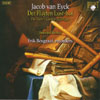Eyck (Der) Fluyten Lust-Hof
With such an artist as guide, this is a delightful tour of a garden of delights
View record and artist detailsRecord and Artist Details
Composer or Director: Jacob van Eyck
Genre:
Chamber
Label: Brilliant Classics
Magazine Review Date: 10/2007
Media Format: CD or Download
Media Runtime: 213
Mastering:
Stereo
DDD
Catalogue Number: 93391

Tracks:
| Composition | Artist Credit |
|---|---|
| (Der) Fluyten Lust-hof |
Jacob van Eyck, Composer
Erik Bosgraaf, Recorder Jacob van Eyck, Composer |
Author: William Yeoman
A merely occasional recorder player, I have never attempted entry into Dutchman Jacob van Eyck’s Flute’s Garden of Delights. As Thiemo Wind has it in the introduction to his substantial booklet-notes, “this repertoire is both loved and feared by professional recorder players today”. Thank goodness, then, for the likes of Erik Bosgraaf, who has recorded a generous selection from this masterpiece for us mortals to stroll through in relative ease and comfort.
Blind at birth, van Eyck (c1590-1657) was not only a campanologist of international renown but also a virtuoso recorder player, entertaining his fellow citizens by playing in the Janskerkhof (St John’s churchyard) in Utrecht on summer evenings. Der Fluyten Lust-hof, a collection largely comprising variations for solo recorder on popular tunes and psalm melodies, was printed in Amsterdam between 1644 and 1649, and was a great success.
Bosgraaf’s virtuosity is stunning, as is his artistry. I particularly enjoyed the variations on tunes that I was most familiar with, like Dowland’s Lachrymae Pavan and Can She Excuse, or Caccini’s Amarilli mia bella, but many new friends were made along the way, like the wonderful Wat zalmen op den Avond doen or the Sarabande. Twelve different instruments are used in order to capture the different characteristics of each piece, ranging from sopranino to tenor; in three of the tracks, Bosgraaf is sympathetically accompanied by Izhar Elias. As a reference work this set should be considered indispensable; as one to be dipped in for pleasure, highly desirable.
Blind at birth, van Eyck (c1590-1657) was not only a campanologist of international renown but also a virtuoso recorder player, entertaining his fellow citizens by playing in the Janskerkhof (St John’s churchyard) in Utrecht on summer evenings. Der Fluyten Lust-hof, a collection largely comprising variations for solo recorder on popular tunes and psalm melodies, was printed in Amsterdam between 1644 and 1649, and was a great success.
Bosgraaf’s virtuosity is stunning, as is his artistry. I particularly enjoyed the variations on tunes that I was most familiar with, like Dowland’s Lachrymae Pavan and Can She Excuse, or Caccini’s Amarilli mia bella, but many new friends were made along the way, like the wonderful Wat zalmen op den Avond doen or the Sarabande. Twelve different instruments are used in order to capture the different characteristics of each piece, ranging from sopranino to tenor; in three of the tracks, Bosgraaf is sympathetically accompanied by Izhar Elias. As a reference work this set should be considered indispensable; as one to be dipped in for pleasure, highly desirable.
Discover the world's largest classical music catalogue with Presto Music.

Gramophone Digital Club
- Digital Edition
- Digital Archive
- Reviews Database
- Full website access
From £8.75 / month
Subscribe
Gramophone Full Club
- Print Edition
- Digital Edition
- Digital Archive
- Reviews Database
- Full website access
From £11.00 / month
Subscribe
If you are a library, university or other organisation that would be interested in an institutional subscription to Gramophone please click here for further information.




